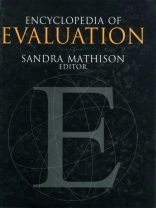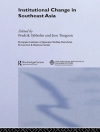All humans are nascent evaluators. Evaluation has been with us throughout history, and in its modern form has moved from the margins to the centers of organizations, agencies, educational institutions, and corporate boardrooms. No longer a specialized, part-time activity, evaluation has become institutionalized, a common practice, and indeed an important commodity in political and social life.
The Encyclopedia of Evaluation is an authoritative, first-of-its-kind who, what, where, why, and how of the field of evaluation. Covering professional practice as well as academia, this volume chronicles the development of the field—its history, key figures, theories, approaches, and goals. From the leading publisher in the field of evaluation, this work is a must-have for all social science libraries, departments that offer courses in evaluation, and students and professional evaluators around the world.
The entries in this Encyclopedia capture the essence of evaluation as a practice (methods, techniques, roles, people), as a profession (professional obligations, shared knowledge, ethical imperatives, events, places) and as a discipline (theories and models of evaluation, ontological and epistemological issues).
International Scope
Despite the fact that evaluation practice is not institutionalized in the same way around the world, the encyclopedia recognizes the international growth of the profession, due in large part to organizations such as UNICEF, the World Bank, and USAID. Entries cover the following: Afghanistan, Belgium, Cambodia, Ethiopia, Germany, Greece, Guyana, Israel, Netherlands, Niger, Scotland, South Africa, Spain, and Uganda.
In addition, the international group of authors includes contributions from more than a dozen nations. There are a number of stories about evaluation practice around the world that are set off as sidebars in the text. These stories provide a glimpse into the nature of evaluation practice in a diverse set of circumstances, delineate the common and uncommon issues for evaluators around the world, and point to the complexities of importing evaluation from one culture to another.
Interdisciplinary Methodological Coverage
Much of the practice of evaluation has grown out of the social science research tradition. While psychological methods and psychometrics continue to be useful, evaluation research today draws from a wide range of disciplines, including anthropology, education, political science, literary criticism, systems theory, and others. This Encyclopedia covers all of the relevant methodologies, including both qualitative and quantitative approaches.
Evaluators and Theories
The Encyclopedia of Evaluation includes significant coverage of the major figures in the field throughout its history. Many of these figures are well known for a particular theory or approach, and whenever applicable, the entries make this connection for the reader as well as provide references for further reading. Good examples include Michael Quinn Patton and Utilization-Focused Evaluation, David Fetterman and Empowerment Evaluation, Daniel Stufflebeam′s CIPP Model of Evaluation, and Huey Chen and Theory-driven Evaluations.
Key Themes
• Concepts, Evaluation
• Concepts, Methodological
• Concepts, Philosophical
• Concepts, Social Science
• Ethics and Standards
• Evaluation Approaches and Models
• Evaluation around the World, Stories
• Evaluation Planning
• Evaluation Theory
• Laws and Legislation
• Organizations
• People
• Publications
• Qualitative Methods
• Quantitative Methods
• Representation, Reporting, Communicating
• Systems
• Technology
• Utilization
Key Features
• More than 100 contributors from around the world
• Single, affordable volume with nearly 600 entries arranged alphabetically
• Entries written by an international team of experts, including narratives that depict evaluation practice around the world
• Reader′s Guide arranges entries into 18 thematic categories to facilitate browsing among core topics
Editorial Board
Ross Connor, University of California, Irvine
Lois-Ellin Datta, Consultant
Melissa Freeman, University at Albany
Rodney Hopson, Duquesne University
Saville Kushner, University of the West of England, U.K.
Yvonna S. Lincoln, Texas A&M University
Cheryl Mac Neil, Community Activist and Evaluation Consultant
Donna M. Mertens, Gallaudet University, Washington DC
James Mugaju, UNICEF
Zenda Ofir, Eval Net
Michael Quinn Patton, Union Institute and University
Hallie Preskill, University of New Mexico
Debra Rog, Vanderbilt University
Patricia Rogers, Evaluation Practitioner, Researcher, and Educator
Thomas A. Schwandt, University of Illinois, Urbana-Champaign
Michael Scriven, Auckland University, New Zealand
Elizabeth Whitmore, Carleton University, Canada
Зміст
List of Entries
Reader′s Guide
List of Contributors
About the Editor
About the Contributors
Preface
Entries A-W
Author Index
Subject Index
Про автора
Sandra Mathison is a Professor of Education at the University of British Columbia, Canada. She has been conducting evaluations, primarily in educational settings, for more than 25 years. She began her career as an internal evaluator at a Canadian community college and has subsequently conducted dozens of external evaluations and served as the Director of Evaluation for the University of Chicago School Mathematics Project for three years. Over these many years and through these many opportunities to do and study evaluation, she has developed an interest in and contributed to evaluation through her emphasis on democratic principles and possibilities. A deep concern for the limitations and limiting nature of evaluation in schools runs throughout her work. Now more than ever, the nature of evaluation within schools constrains what it means to adequately determine what is good and bad in schools, and thus limits the possibilities for improvement. Her current research focuses on these limits of evaluation in schools. With funding from the National Science Foundation, she is conducting research on the effects of high stakes testing on teaching and learning in elementary and middle schools. Mathison has written extensively about this topic in an effort to encourage a more informed public discourse about the value of schools and schooling. She chaired the American Evaluation Association task force that created a policy statement on high stakes testing in K-12 schooling. She is coeditor (with E. Wayne Ross) of Defending Public Schools: The Nature and Limits of Standards Based Reform and Assessment.












